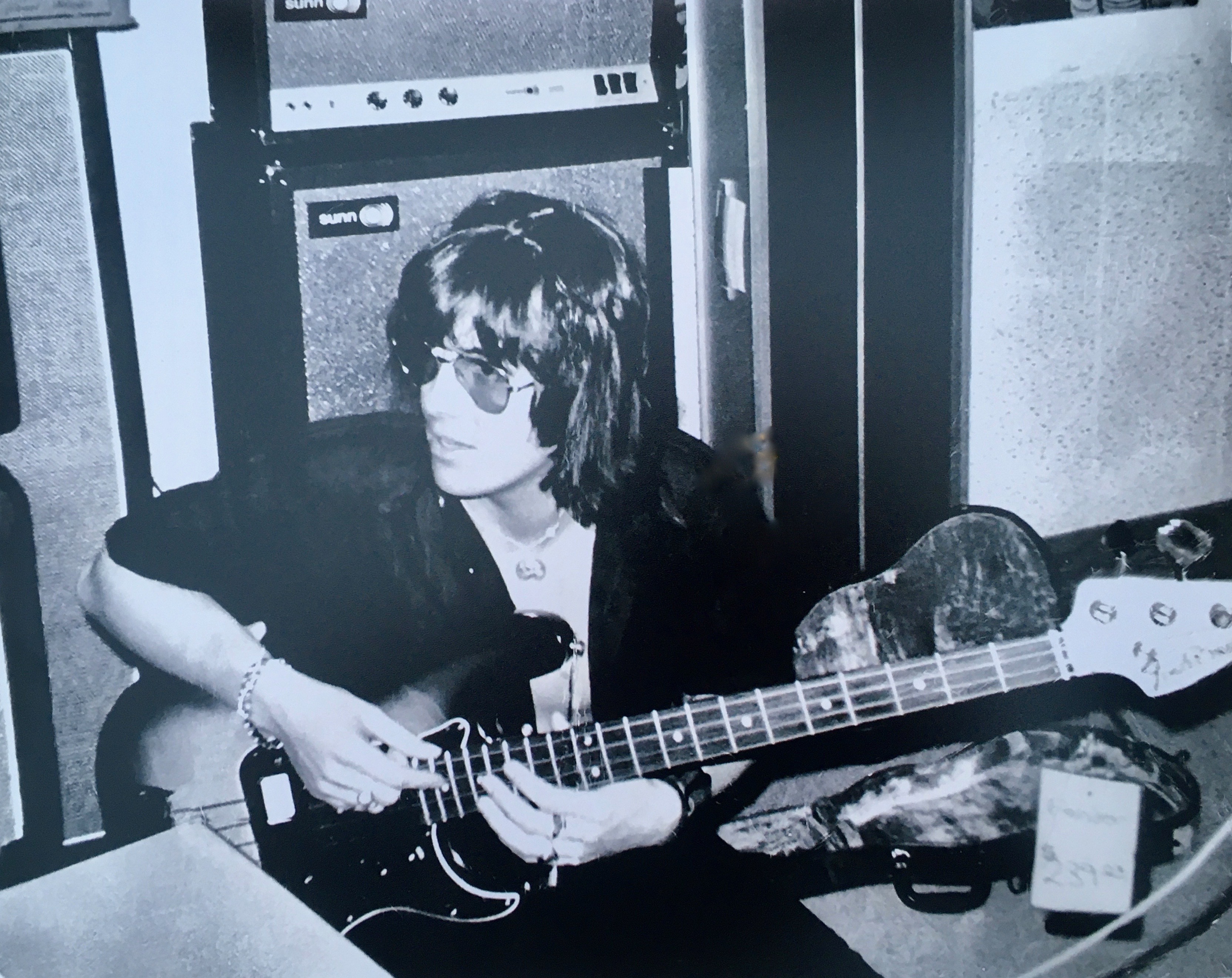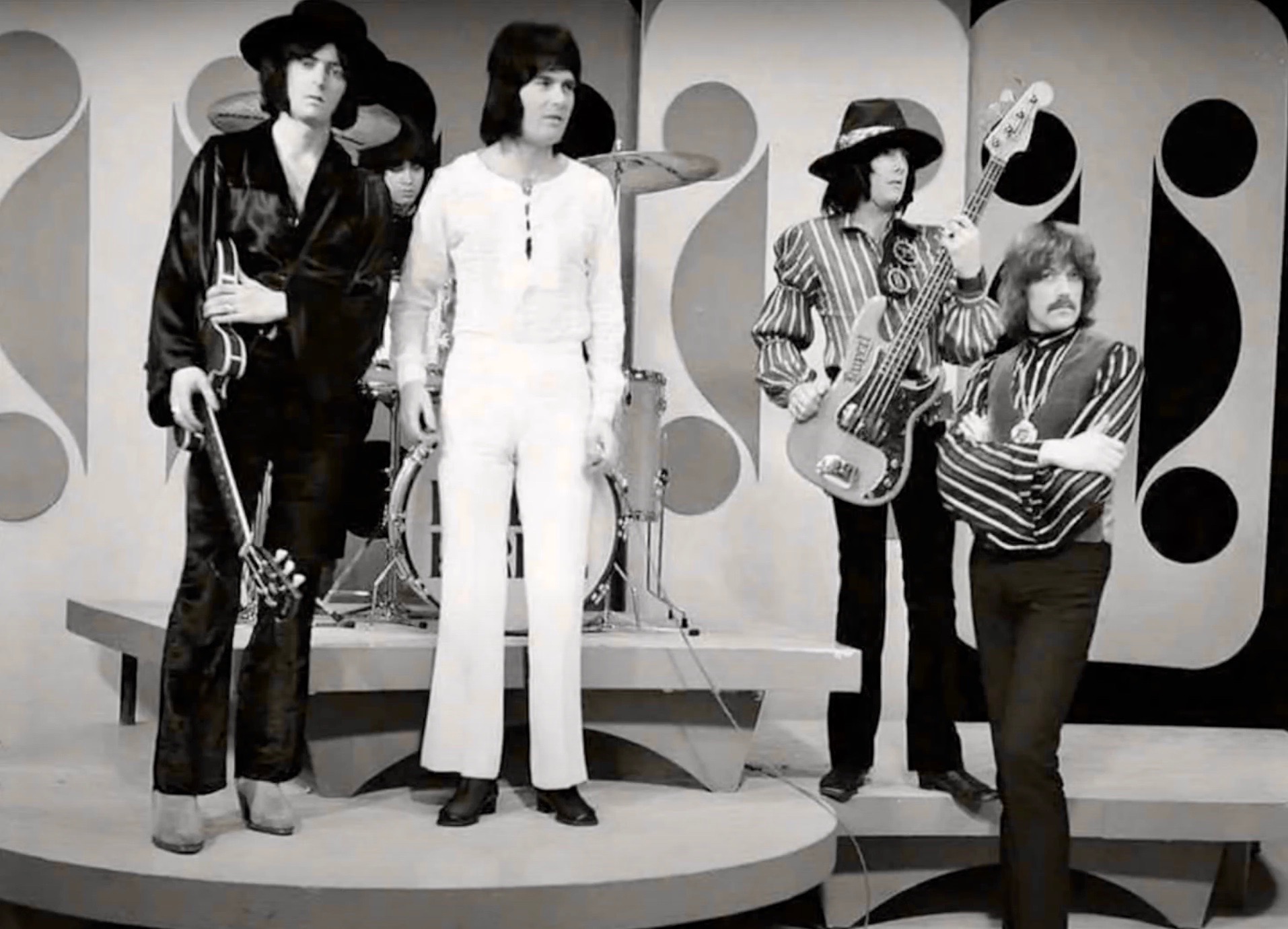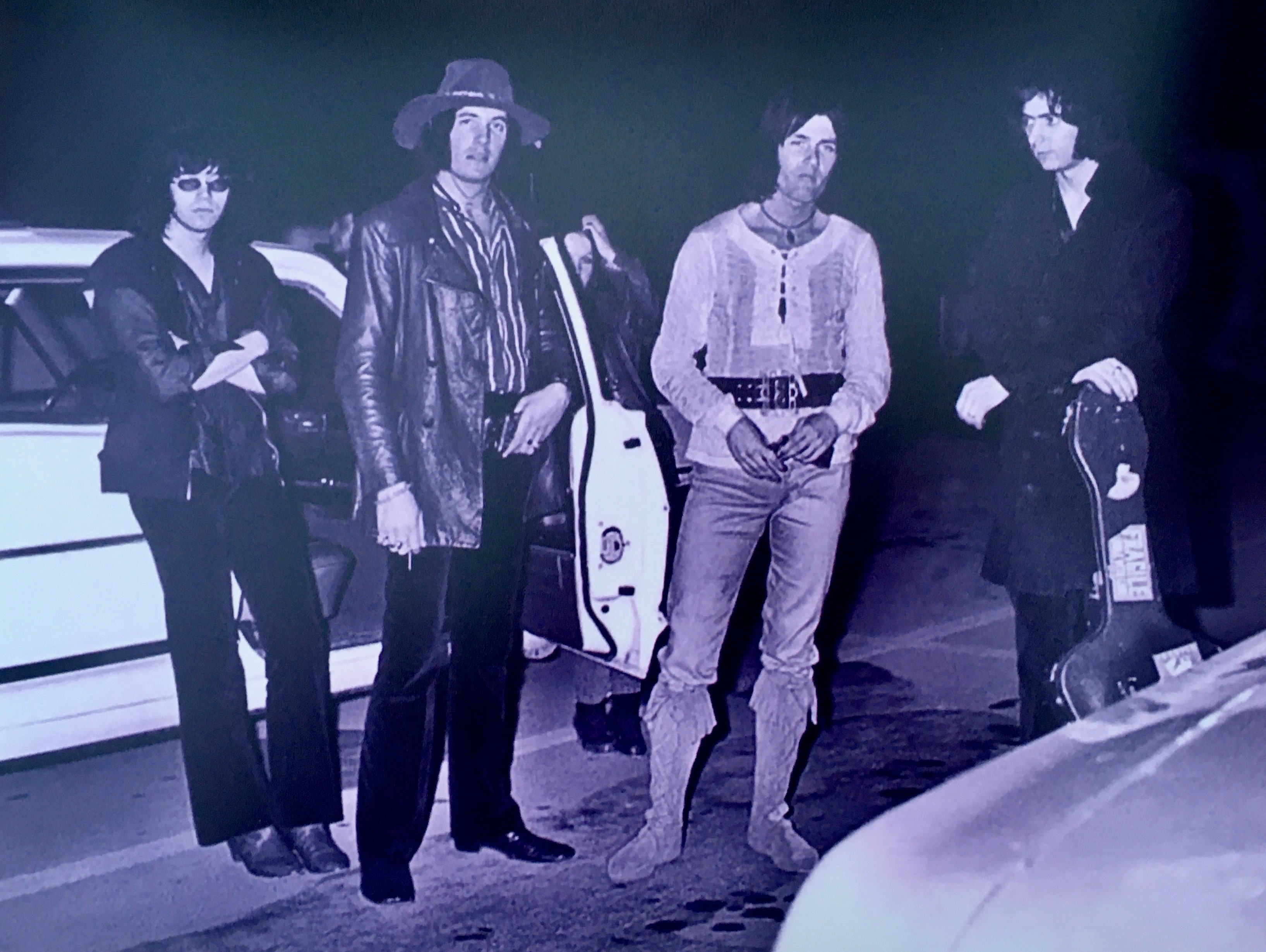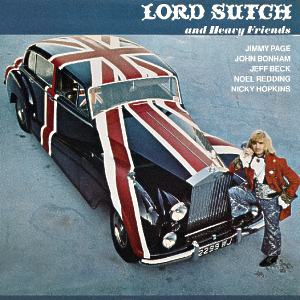After a mere four days’ rest, it was back to work with an appearance on BBC2’s “Late Night Line-up”, followed two days later by a radio recording for John Peel’s “Top Gear” program. January 1969 also saw us back in the recording studio to work on our third album, between more gigs and radio shows. Once again it was a struggle to come up with material. Without doubt Rod Evans was a real creative force, effortlessly penning great lyrics to any tune that the rest of us suggested. Jon continued to push his classical ideas but they were now wearing thin, particularly with Richie who, like myself, was eager to toughen the music up a little and leave the flowery stuff to band such as The Nice, and Yes!
Richie and I began to make visits to the home of record producer Mike Vernon who had offered us a record deal before Evans and Paice had joined. He had an absolute huge record collection, rock and blues mainly, which we would trawl through seeking inspiration. Meanwhile we were getting more gigs on what came to be called “The College Circuit”. Student unions seemed to be awash with cash and much of it was spent on concerts. Often three or four groups would feature on a typical college show which usually proved to be quite lucrative. Also our huge success in America and Canada was permeating through to other territories, as reported in the Cashbox International pages, but back home it was still an uphill struggle. Live shows presented no problem; we knew that we were a force to be reckoned with who could hold our own anywhere, but the total apathy of EMI Records meant that British single and album sales were still extremely poor! We consoled ourselves however with the welcome news of a return to the USA in March.
We were speedily forging a reputation as a good act, simply by the sheer force of our live shows, and figured it would only be a matter of time before we broke through at home. Regular live radio broadcasts were helping to promote us and on February 6th, following our return from another successful trip to Denmark, we appeared in front of a live audience on the prestigious Radio One Club, hosted by the flamboyant DJ Emperor Rosko. Also on the bill were The Move, a huge act at the time. Singer Carl Wayne was intrigued by Rod Evans’ chainmail vest, purchased in San Francisco, and it wasn’t long before cash changed hands and Carl was the new owner of this unique garment!
During this trip a memorable moment occurred near Birmingham, when I steered our hire car out of a transport café onto the right-hand side of the road. I was very comfortable on the right after three months driving in the US. As we approached a junction someone remarked that the oncoming traffic was on the wrong side of the road. I suddenly realised that we were on the wrong side and swiftly switching to the left, possible disaster was averted!
In between radio gigs and live shows the third album, to be called simply Deep Purple , was slowly taking shape. When we found that we were one song short for a radio broadcast we had hurriedly cobbled together a tune that we named “Hey Bop a Re Bop”. This had worked better than expected and so Rod wrote some clever new lyrics and we recorded it for the new album under the title The Painter. This was fronted by a piece of psychedelia featuring a backwards drum track, whilst I cranked the bass up through a fuzz box. Chasing Shadows was another very original song built upon an unusual bass and drum track created by Ian and myself. Rod, as usual, wrote the lyrics as the song progressed. Jon, meanwhile, was attempting to create material by himself rather than with the rest of us. Maybe he thought that he would be more creative without our interference. Personally I think that his appreciation of the possible financial rewards of songwriting was the driving force!
He was also into other future career moves, hoping to produce other artists with the backing of HEC Enterprises. Richie was not too pleased that find that Jon had “borrowed” one of our back-tracks and put on a vocal by his girlfriend, but the dire result soon ended that experiment! Another idea was for he and I to put some cash together and form a limited company, but the purpose of the company was unclear and the idea was dropped. Our friendship still seemed as strong as ever but understandably, with his wedding day drawing near we did not socialize as much as before. Soon we would both abandon our shared room at Second Avenue, with Jon taking on a flat near Fulham, while I stayed mostly back at my parents’ house in Hayes.
Generally the group members had formed a pretty close bond with each other and eagerly anticipated seeing some financial rewards from our immense success. Ron Hire obviously felt the same as he proudly showed us the plot of his new detached home in Brighton which he had purchased on the strength of the success of Hush and the Shades album. Sadly Ron’s world was soon to come crashing down when he was arrested for receiving stolen goods. It was hardly the crime of the century, but Ron was to spend a year in Ford open prison. Edwards and Coletta immediately distanced themselves from him and ruthlessly kicked him out of the partnership. I thought that this was rather unfair, considering how he had supported John Coletta when he was unable to come up with his share of the funding for the project when it began. Of course Ron’s situation provided a huge boost to John and Tony who now each had a much larger percentage of Deep Purple’s income! We were very sad to see Ron Hire depart. He had been the easiest of the three managers to get on with and we all missed his lively, cheerful personality. Of course I was not to know that then that I would be doing business once more with Ron in the not-too-distant future.
Most of February was taken up with BBC broadcasts and college gigs, between which we were in the studio as often as possible. The trio of Derek Lawrence, Martin Birch and Barry Ainsworth was functioning as before and the new album was shaping up pretty well. The only dissent was an argument about songwriting credits which was never fully resolved. Another argument developed with Richie. By now Rod and Jon had received considerable amounts of money as the writers of One More Rainy Day, the B-side of Hush. Ritchie considered it grossly unfair for Rod to receive so much money for ‘merely’ writing lyrics, whilst I argued that good lyrics were far more difficult to achieve than guitar licks! Ritchie, of course, disagreed and didn’t speak to me for several days.
However all this was forgotten by March 1st when we played a great show at Bridgend, at the same time celebrating the first anniversary of Deep Purple. We all agreed that we had achieved more than we had ever dreamt of just one short year ago! This was followed by Jon’s stag night celebration on March 3rd before he married Judith the next day. On the morning of March the 5th, together with John Coletta and Tony Edwards the band convened at our Newman Street headquarters to meet with accountant Bill Reid. With eager anticipation we waited for Bill, a portly, cigar smoking, slightly pompous individual who swept in and ceremoniously handed each of us a set of accounts, neatly bound into a folder.
We quietly perused the jumble of figures which were totally meaningless to all of us. Jon Lord, always eager to please, broke the silence by mumbling that he was happy with figures, whilst Ritchie and I looked at one another, not wishing to appear stupid. “Ask him, Nick” barked Richie at which Bill Reid said, What do you need to know, Nicky?”. I replied to Bill, “ I need to know what I am worth!”. Bill’s reply hit the whole group like a bombshell. “You’re worth precisely nothing!” was his reply followed by “You owe the management £9,000!”. What was said following that pronouncement has been long forgotten, but I determined in that moment to ensure that not a cent was wasted in future and insisted on laying down some ground rules. Naturally any popularity I had with NEC Enterprises went into a terminal dive!
The following weekend lightened the mood when the group attended two parties. On Saturday March 8th we celebrated the 21st birthday of my girlfriend Janet, followed on Sunday by a celebration of Jon’s marriage. The following couple of weeks were very busy with gigs at Newcastle, Redditch, and Kent University, plus two days recording, before playing the famous Speakeasy in London, a gig attended by almost exclusively by musicians including the up-and-coming Yes, and our old adversary Ginger Baker. Two more college dates followed before we flew to Zurich for a TV show. Afterwards we visited a nightclub where the owner offered us a bottle of whisky if we would play a couple of songs using the house band’s instruments. Naturally the whisky was duly demolished before we happily staggered back to the hotel where Rod and I assisted Richie to ascend the extra flight of stairs to his room. On our return we enjoyed the luxury of four days rest before flying back to Los Angeles on Saturday March 29th for our second US tour.



On my insistence we checked into a small motel where everyone was a little dismayed at the lack of opulence, having previously enjoyed the luxury of the Sunset Marquis. However, as I pointed out, it was clean, had TV in every room and a decent-sized swimming pool, plus it was only a quarter of the price! They soon cheered up. It was good to see our friends at Tetragrammaton who assured us of our rising status in the USA. Jeff Wald informed us that our records were enjoying huge sales, saying that we were bigger than many of our fellow acts, and chasing Jimi Hendrix in popularity. Jeff finished his pep-talk by telling us that we were now “pretty wealthy guys!” which was a bit hard to swallow so soon after our meeting with our accountant.
After a couple of days rest we headed out with Jeff for the start of our tour. Kentucky Woman and the second album were still popular, and one of our record company’s important moves was to arrange regular visits to record stores. Unlike our little shops back home, U.S. record stores were massive warehouse-sized outlets, where singles and albums were stocked in thousands! An hour spent in these establishments, promoted on local radio, would see us sign literally hundreds of copies.
Our popularity meant that we were playing quite large venues and thankfully were being well received by the audiences. We usually had several other bands in support, and one of these for quite a few gigs was the band led by legendary British blues singer John Mayall. Richie was particularly impressed by his guitarist, and, after a listen I had to agree that he was really good. Following their set we congratulated the guitarist in the dressing room. After thanking us he looked at me and said “You don’t know who I am, do you?”. He looked vaguely familiar but I didn’t know his name. He then said, “Do you remember the Gods?”. It dawned on me then that it was Mick Taylor! Together we had attempted to form a new group loftily named the Gods, which sadly came to nothing, several years ago. Well, we reminisced for a while until it was time to go on stage. After the show Mick joined us for a drink and expressed his admiration for what we were doing. For the rest of the tour Mick and I got together whenever we could, and really hit it off.
April 4th saw us play Vancouver where Richie was reunited with his old Canadian bandmate from the Outlaws, Ken Lundgren. By April 18th we had gradually worked our way back to Los Angeles where we had three shows in as many days. The third show was booked at what many considered the trendiest night spot in town. Known as The Factory, that is exactly what it had been, a strange converted workplace, where the actual venue was reached via a lift. As the road crew assembled our equipment the place began to fill with people, including Tetragrammaton boss Bill Cosby who was accompanied by David Janssen, famous for his leading role in long running TV show The Fugitive. We chatted to the house band who all seemed strangely subdued. It appeared that several weeks previously Frank Sinatra had paid a visit and took exception to their volume. Sinatra’s entourage left them in no doubt as to what would happen if they didn’t comply, and the group were a little worried that he might turn up for our show. Luckily he didn’t show up, but he would not have had caused to complain as we did not get to perform! A very strange anomaly with the steel construction of the building led to so much interference that it was impossible to play!
Following the Factory debacle we had four days off. On the first day I visited the local music store, a large shop stocked with hundreds of guitars. The friendly owner approached me and asked if I could would consider taping an endorsement of his store to play on local radio. In return he would allow me to pick any guitar as a fee. After speaking the necessary words onto his tape machine I left the shop being a proud owner of a brand-new black Fender Precision bass guitar, complete with case. I returned to our motel to find Mick Taylor and the rest of Deep Purple sitting around the pool. After showing them the bass and recounting the details, it was not long before Richie Blackmore grabbed a roadie and headed for the shop. Much to Richie’s disgust the owner explained that he had no plans for more advertisements, leaving Richie wishing that he’d got there before I did.
Now, it just so happened that during the week I was visited by my friend Bob Lefevre of Sunn amplification. Bob was carrying a Fender Stratocaster guitar which had been given to him by Jimi Hendrix on tour. He explained that Jimi was not happy with the guitar. Bob could not play himself and so he gave it to me. I soon realised that it was not as good as my own Stratocaster which I tinkered with back home. Now it also happened that Richie was not happy with his current guitar, a hybrid Stratocaster with an ill-fitting Telecaster neck. Now this guitar, which refused to stay in tune, had previously been owned by Eric Clapton. I soon had a brain wave! Why, I suggested to Blackmore, didn’t he take these two below par guitars to the guitar store and try to swap them for a new model? Well, that’s exactly what he did, returning with a brand-new Stratocaster and a big smile on his face! The other two guitars just disappeared into the mists of time. Just imagine their value today had we kept them!
During our time off Mick Taylor was keen to show me a group that had secured a residency at the Whisky-a-Go-go. Mick thought that they were amazing, as did lots of other British musicians who flocked to the venue. I had to agree that they were as good as he said, and we went to see them as often as possible. The group were known simply by the initials CTA, which apparently stood for Chicago Transit Authority. Later they became known as just Chicago and quite deservedly became a huge name.
A string of gigs followed our break in such places as Fresno, San Diego, and a couple in Oregon, before arriving at a club gig in Rhode Island. There was a rare malevolent atmosphere at this venue and it was a relief to put our gear into the car before leaving. Suddenly we found ourselves surrounded by a gang of ugly looking characters obviously out for trouble. One guy circled our car on a battered pushbike, one lent menacingly against the side whilst two more sat on the wings. “What do you think?”, I asked as I started the engine. “Give it the gun!”, said Ritchie, so I hit the gas pedal hard, causing the car to spin on the gravel, throwing the potential troublemakers in all directions. Making sure that no one was hurt I then gunned the big V8 car towards the highway, but in a flash they were behind us in their own car, ramming our rear bumper, just like the scene in the film ‘In The Heat Of The Night’ with Sydney Poitier. It was hard to keep a cool head as I drove up the elevated section of highway but I knew that the Holiday Inn was on our left so I deliberately signalled right before exiting left at the last moment and luckily wrong-footed our pursuers. Screaming obscenities from their car they promised to “get us next time” before having to keep on driving. As I parked outside the hotel my bandmates literally fell out of the car and ran for the lift, leaving me to retrieve our guitars from the boot!

We were now about halfway through the tour when one sunny afternoon I found myself alone with manager John Coletta. We had driven from L.A. to the beach where we had enjoyed a dip in the ocean. With Jeff Wald’s most recent comments about our new-found wealth still in my head I decided to tackle Coletta about the subject. He listened as I told him of my ambitions to buy a new car and maybe to pay off my parents’ mortgage on their home. He looked at me very seriously and said, “You can do all that Nicky, and more!”. He then proceeded to tell me that we were all now dollar millionaires! I said that I didn’t feel like one. He then explained that at present it was only figures on paper, but before long we would see it in our bank accounts. He then finished our conversation by telling me that if Deep Purple ended tomorrow, none of us would ever have to work again! This was indeed sweet music to my ears, but I could have had no idea of the storm that was approaching!
| Chapter 23 ← | → Chapter 25 |
